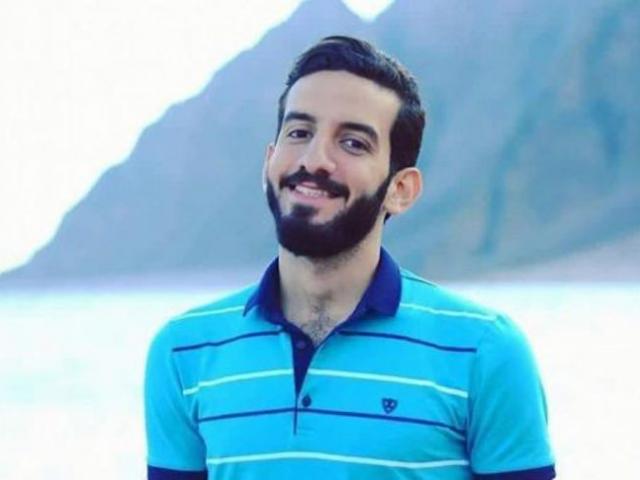
Student leader Moaz al-Sharqawi and others referred to a new trial before the terrorism court
Press Release
The Egyptian Initiative for Personal Rights (EIPR) condemns the referral of former student leader Moaz Al-Sharqawi to a new criminal trial on terror charges in continuation of a series of violations and abuse against him that lasted six years.
The Third Circuit (Terrorism) of the Cairo Criminal Court will hold the first session of trial for Al-Sharqawi and 18 others at Badr Prison Complex on Tuesday, January 23rd, in a new case (No. 13330 of 2023 – al-Marg Felonies). They face charges of joining a terrorist group, financing terrorism, and using an application (WhatsApp) to commit a terrorist crime. The crimes attributed to Al-Sharqawi carry a penalty of life imprisonment.
As Al-Sharqawi’s legal representative, EIPR submitted a complaint to the Public Prosecutor in June 2023, detailing flagrant violations of his constitutional rights and the terrorism law.
On June 3rd, 2023, Al-Sharqawi appeared before the State Security Prosecution in New Cairo for the first time since his arrest from his home more than three weeks earlier, during which he was subjected to torture and enforced disappearance and was denied access to his family and lawyer.
Al-Sharqawi told prosecutor Mohamed Hussein that he was taken to an unknown location after his arrest on May 11th, 2023, at the hands of National Security officers. During the early days of his detention, he was beaten several times on the face and shoulders with hands and shoes by individuals whom he could not identify, as he was blindfolded throughout his detention.
He added: “During the investigation, people beat me with their hands on my face and body, and I got injured in my left ear and my shoulders. Then, they put me in custody and treated me until I recovered, then they brought me before the prosecution.”
The two EIPR lawyers who attended the investigation with al-Sharqawi proved that he had been subjected to torture and enforced disappearance. Al-Sharqawi and his lawyers were surprised during the inquiry that the prosecution had issued a decision to detain him under the terrorism law for 14 days, which was renewed for a similar period. An amendment to the terrorism law in 2015 included new provisions allowing defendants to be detained for up to 28 days on the grounds that “there is a danger of a terror crime, and it is necessary to confront this danger”.
However, the same law stipulates guarantees and conditions even when using this exceptional power that violates the constitution, foremost of which is that “[the detainee] shall have the right to communicate with whomever he deems appropriate to inform them of what happened, and to seek the assistance of a lawyer”. The law also stipulates that “the accused shall be held in one of the places designated by law”. The guarantees also include issuing a reasoned order by a public defender and allowing the detainee to appeal the decision of detention before the court, which should look into the appeal within three days of the issuance of the detention decision or its renewal. Otherwise, the detainee must be released immediately.
EIPR said the National Security officers and the Supreme State Security Prosecution officials violated all these guarantees and rights. It noted that their insistence for 23 days on denying al-Sharqawi’s detention, concealing his whereabouts, and depriving him access to his family and lawyer are conclusive evidence that the crime of enforced disappearance had been committed under the constitution, the Code of Criminal Procedures, and international law.
EIPR noted that these crimes were committed despite the Public Prosecution’s early knowledge of them, as al-Sharqawi’s family had submitted a complaint to the Public Prosecutor’s Office the day after his arrest requesting an investigation into the arrest and demanding the revelation of his place of detention. A week later, EIPR lawyers submitted another complaint to the Public Prosecutor’s Office requesting an investigation into al-Sharqawi’s enforced disappearance and demanding that he be allowed to meet his lawyer.
Al-Sharqawi was subjected to prolonged detention before against the background of his previous activity as deputy head of the Tanta University Students’ Union. He was arrested in September 2018 and subjected to enforced disappearance for about 25 days, during which he was subjected to physical and psychological torture. An order was issued to release him in April 2020.
In May 2022, the Emergency State Security Criminal Court sentenced al-Sharqawi to 10 years in prison, followed by five years of police surveillance, on a charge of joining a terrorist group based solely on the testimony of the investigating officer. Last October, EIPR learned that the President of the Republic ratified the ruling issued under the emergency law that denied the convicts the right to appeal.
The UN documented the violations against al-Sharqawi in a memorandum sent to the Egyptian government last August by the Working Group on Enforced or Involuntary Disappearances, the Special Rapporteur on the situation of human rights defenders, and the Special Rapporteur on the promotion and protection of human rights and fundamental freedoms while countering terrorism.
The decision to refer al-Sharqawi to trial in the new case was issued last December. The National Security investigation report, which was accessed by the defence team, said al-Sharqawi “organised many demonstrations and events to demand the release of imprisoned Muslim Brotherhood students”. EIPR said the investigation report proved that al-Sharqawi was targeted solely because of his legitimate student activity while studying at the university’s Faculty of Arts. Although al-Sharqawi asserted repeatedly that he did not join any political party or organisation, the State Security Prosecution again charged him with joining the Muslim Brotherhood group without evidence.
EIPR renewed its call for the release of al-Sharqawi and for an immediate investigation into the violations he was subjected to due to his peaceful activism since 2018.



